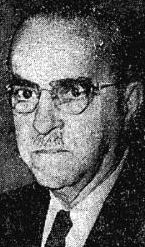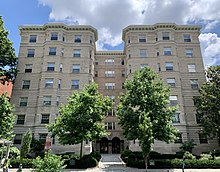Frank Russell White
Frank Russell White (May 2, 1889 – October 24, 1961) was an American architect who designed hotels, apartment buildings, commercial properties, and thousands of homes in Washington, D.C. A native of Brooklyn, White's family moved to the nation's capital during his childhood. Although he had no formal training, White was tutored by local architect Albert H. Beers and designed thousands of buildings for developer Harry Wardman.
Frank Russell White | |
|---|---|
 | |
| Born | May 2, 1889 |
| Died | October 24, 1961 (aged 72) |
| Nationality | American |
| Occupation | Architect |
| Spouse(s) | Eula Griffin (divorced) Carolyn W. White |
| Children | Dorothy W. Neilson Frank Russell White, Jr. |
| Buildings | Clifton Terrace Wardman Park Hotel |
White designed buildings in various styles, including Art Deco, Classical Revival, Colonial Revival, and Mediterranean Revival. One of his most well-known works is the Wardman Park Hotel, which was demolished in the 1970s and replaced with a modern building. One of his apartment designs, Clifton Terrace, is listed on the National Register of Historic Places.
White's personal life was often tumultuous, including his first marriage to an aspiring actress. During the Great Depression he experienced financial difficulties and was arrested on counterfeit charges along with his future second wife. After serving a two-year prison sentence, White continued to design buildings until his death in 1961.
Biography
Career
Frank Russell White was born on May 2, 1889, in Brooklyn, New York. He attended public schools in New York until his family moved to Washington, D.C., when he was ten years old.[1][2] White attended the Valley Forge Military Academy and College from 1903 to 1904 and began apprenticing for architect Albert H. Beers in 1908.[2][3] As real estate developer Harry Wardman's chief architect from 1905-1911, Beers designed around 1,000 houses and 70 apartment buildings. Several of these apartment building designs were completed by White after Beers' death in 1911, including the Northumberland Apartments at 2039 New Hampshire Avenue NW, The Dresden at 2126 Connecticut Avenue NW, and The Avondale at 1734 P Street NW.[3][4]

White continued working for Wardman, becoming one of his master architects at a time Wardman was building thousands of homes and apartment buildings in Washington, D.C. The combination of Beers' tutoring and working with prolific developer Wardman resulted in White becoming a skilled architect, designing a variety of building types. White's professional relationship with Wardman continued for 25 years, although he began working with other developers in 1917 including Victor Cahill, Anita Eckles, Zachariah T. Goldsmith, Fred Gore, Joseph A. Howar, Karla King, and Ernest G. Walker.[3]
The buildings White designed demonstrate a variety of architectural styles. Examples of this include three Clifton Terrace buildings in the Colonial Revival style, The Lealand on 16th Street NW in the Mediterranean Revival style, the Northbrook Courts on 16th Street in the Classical Revival style, and the Heurich Building (demolished) on K Street in the Art Deco style.[5][6] In addition to designing, White also developed buildings later in his career, including the Schuyler Arms on Columbia Road NW and Parkway Apartments on Connecticut Avenue NW.[5]
During his career White designed over 5,000 houses, 51 apartment buildings, hotels, commercial properties, and even an affordable bomb shelter meant to hold 30 people.[3][7] In addition to Clifton Terrace, which is listed on the National Register of Historic Places, White's most well known work is the original 1200-room Wardman Park Hotel, built in 1917 and modeled after The Homestead resort in Virginia.[3][8][9] The hotel was torn down in the late 1970s and replaced with a modern facility.[8]
Personal life
First marriage
When he was 18, White married Eula Griffin, an aspiring actress.[8] The couple had one child, Dorothy, but their tumultuous relationship and bitter divorce were the subjects of local newspaper reports. Griffin filed for divorce in 1923, two years after the couple first separated, and told the court White had left their home at The Ambassador and was living in an apartment on G Street NW where "misconduct with several women" took place.[10][11] A few months later White told the court his wife had been staying out all night the month he left and claimed she had been dating a Navy lieutenant for the past year, the same man she was arrested with for disorderly conduct while at the Wardman Park Hotel pool in 1922. During one visit to his wife, White said he found her "very lightly clad, the bedroom poorly lighted and a man sitting in the bedroom."[12] They continued accusing each other of improper behavior and the divorce was later finalized.[8][13]
Arrest
During the Great Depression White experienced severe financial difficulties. He was known to be bad at dealing with finances, including giving loans to unethical friends and being involved in projects that were not financially sound.[2][8] One of these projects included White taking out a $340,000 loan (over $5 million in 2020 dollars[14]) to build the Parkway Apartments. When the project did not live up to expectations, White had to move to Bowie, Maryland, to live with his mother, where the two were unable to afford coal to heat the house.[8]
During this time White had very few projects and in 1930 he resorted to crudely making 21 counterfeit $100 bills by changing the numbers in the corners of $1 bills.[8][15] A year later his girlfriend Carolyn Wildman of Washington, D.C. attempted to make a purchase at a Baltimore jewelry store with one of the counterfeit bills and was arrested. On October 26, White turned himself into the Secret Service, and the couple plead guilty. White served two years in prison and Wildman served one year and a day.[2][8][15]
Later years
After having served their sentences, White and Wildman married and had a son, Frank Russell White, Jr.. White continued his architectural practice a few years later, working on mostly smaller projects, and Carolyn, a former teacher who had attended the University of Maryland and Hood College, worked for the Department of Agriculture and was an active member of the National Society of the Daughters of the American Revolution.[8][16] The couple lived at 4645 Alton Place NW.[2][7]
White died of a blood disorder on October 24, 1961, at George Washington University Hospital. White was still designing buildings when he died, including a hotel and motel.[7] Carolyn retired in 1964 and died at Sibley Memorial Hospital in 1977.[16]
Selected works
|
|
References
- Hughes, Laura A.; Bunting, Jennifer J.; Moffett, Simone M. (July 27, 2001). "National Register of Historic Places Nomination Form - Clifton Terrace". National Park Service. Retrieved July 29, 2020.CS1 maint: multiple names: authors list (link)
- Williams, Paul Kelsey (December 2006). "Scenes from the Past..." (PDF). The InTowner. p. 10. Retrieved July 29, 2020.
- "DC Architects T-Z" (PDF). District of Columbia Office of Planning. Retrieved July 29, 2020.
- "DC Architects A-B" (PDF). District of Columbia Office of Planning. Retrieved July 29, 2020.
- Eig, Emily Hotaling; Hughes, Laura Harris (July 1993). "National Register of Historic Places Nomination Form - Apartment Buildings in Washington, D.C 1880-1945". National Park Service. Retrieved July 30, 2020.CS1 maint: multiple names: authors list (link)
- "Heurich Building (Washington, D.C. : K Street)". Library of Congress. Retrieved July 30, 2020.
- "Architect Frank White Dead; Designed the Wardman Park". The Washington Post. October 25, 1961.
- Brunner, Rob (August 2, 2018). "What Happens When You Discover Your House Was Designed by a Criminal?". Washingtonian. Retrieved July 29, 2020.
- Evers, Donna (June 2006). "It's a Wardman". Washington Life. Retrieved July 30, 2020.
- "Denies Wife's Charges". Evening Star. June 2, 1923.
- "Capital Architect is Sued for Divorce". The Washington Post. May 24, 1923.
- "White Names Navy Officer in Divorce". The Washington Post. June 2, 1923.
- "'Framed'" Raid Won Divorce for Wife, New Witness Says". The Washington Post. February 13, 1924.
- Webster, Ian. "Value of $340,000 from 1927 to 2020". CPI Inflation Calculator. Retrieved July 29, 2020.
- "Hard Times And Race Victory Blamed In Counterfeiting". The Baltimore Sun. October 27, 1931.
- "Carolyn White, Served 2 Terms As DAR Regent". The Washington Post. April 10, 1977. Retrieved July 30, 2020.
- "1842 16th Street NW". District of Columbia Office of Planning. Retrieved July 30, 2020.
- "District of Columbia Inventory of Historic Sites" (PDF). District of Columbia Office of Planning. September 30, 2009. Retrieved July 30, 2020.
- Moeller Jr., G. Martin (2012). AIA Guide to the Architecture of Washington, D.C. JHU Press. p. 169. ISBN 9781421402703.
- "2320 Massachusetts Avenue NW". District of Columbia Office of Planning. Retrieved July 30, 2020.
- "1901 Columbia Road NW". District of Columbia Office of Planning. Retrieved July 30, 2020.
- "1631 S Street NW". District of Columbia Office of Planning. Retrieved July 29, 2020.
- "532 20th Street NW". District of Columbia Office of Planning. Retrieved July 30, 2020.